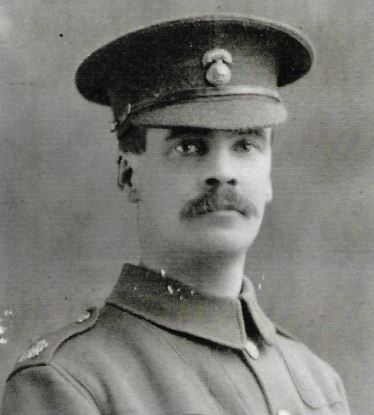Sjt
Robert Orwin
Information about birth
|
Year of birth: 1880 |
|
Place of birth: Springwell Village, Durham, England, United Kingdom |
General information
|
Profession: Colliery Station Master |
Army information
|
Country: England, United Kingdom |
|
Force: British Expeditionary Force |
|
Rank: Serjeant |
|
Service number: 19/645 |
|
Enlistment place: Newcastle upon Tyne, Northumberland, England, United Kingdom |
|
Units: — Northumberland Fusiliers, 19th Bn. (2nd Tyneside Pioneers) (Last known unit) |
Information about death
|
Date of death: 24/11/1917 |
|
Place of death: Dozinghem Casualty Clearing Station, Westvleteren, Belgium |
|
Cause of death: Died of wounds (D.O.W.) |
|
Age: 37 |
Cemetery
|
Dozinghem Military Cemetery Plot: XIII Row: E Grave: 11 |
Distinctions and medals 2
|
British War Medal Medal — 15/01/1920 |
|
Victory Medal Medal — 15/01/1920 |
Points of interest 3
| #1 | Place of birth | ||
| #2 | Enlistment place | ||
| #3 | Place of death (approximate) |
My story
Serjeant Robert Orwin served in the Northumberland Fusiliers, 19th Battalion. This unit was the Divisional Pioneer Battalion of the 35th Division.
The 35th Division had been active in Flanders during the Third Battle of Ypres. During the month of November 1917 the 19th Northumberland Fusiliers was stationed along the Canal Bank, near the village of Boezinge. In the beginning of November they worked on maintaining and laying duckboards and tracks between Boezinge, to the North of Ypres, and the Houthulst Forest. Starting from the 5th of November 1917 all Companies of the Battalion were working under command of the 173rd Tunneling Company of the Royal Engineers, which was constructing and maintaining roads at the village of Langemark at the time.
The 19th Northumberland Fusiliers suffered several casualties throughout the month of November. Most casualties were sustained due to German shellfire. Serjeant Robert Orwin was possibly wounded due to shellfire while working on the roads near Langemark. He was evacuated to the Dozinghem Casualty Clearing Station in Westvleteren, where he died of his wounds on the 24th of November 1917. He was buried on Dozinghem Military Cemetery.
The 35th Division had been active in Flanders during the Third Battle of Ypres. During the month of November 1917 the 19th Northumberland Fusiliers was stationed along the Canal Bank, near the village of Boezinge. In the beginning of November they worked on maintaining and laying duckboards and tracks between Boezinge, to the North of Ypres, and the Houthulst Forest. Starting from the 5th of November 1917 all Companies of the Battalion were working under command of the 173rd Tunneling Company of the Royal Engineers, which was constructing and maintaining roads at the village of Langemark at the time.
The 19th Northumberland Fusiliers suffered several casualties throughout the month of November. Most casualties were sustained due to German shellfire. Serjeant Robert Orwin was possibly wounded due to shellfire while working on the roads near Langemark. He was evacuated to the Dozinghem Casualty Clearing Station in Westvleteren, where he died of his wounds on the 24th of November 1917. He was buried on Dozinghem Military Cemetery.
Sources 2
|
Army Troops. 173 Tunnelling Company Royal Engineers , (The National Archives, KEW (TNA), WO 95/335/6). https://discovery.nationalarchives.gov.uk/details/r/C14303 Further reference |
|
Divisional Troops: 19 Battalion Northumberland Fusiliers (Pioneers). (The National Archives, KEW (TNA), WO 95/2477/7). https://discovery.nationalarchives.gov.uk/details/r/C14303 Further reference |
More information 4
|
Commonwealth War Graves Commission Database https://www.cwgc.org/find-records/find-war-dead/casualty-details/153570 |
|
Namenlijst (In Flanders Fields Museum) https://namenlijst.org/publicsearch/#/person/_id=50d326cc-8596-4341-b2ed-f2c33c89e0f0 |
|
Lives of the First World War (Imperial War Museum) https://livesofthefirstworldwar.iwm.org.uk/lifestory/3339906 |
|
Lives of the First World War (Imperial War Museum) https://livesofthefirstworldwar.iwm.org.uk/lifestory/5395408 |
